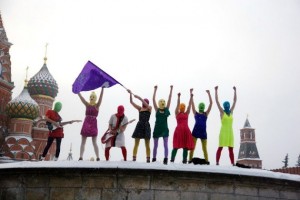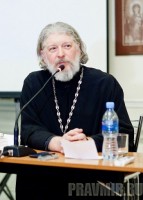Moscow’s Khamovnichesky District Court has given its verdict on the members of the punk group with regard to their scandalising demonstration in the Cathedral of Christ the Saviour. Nadezhda Tolokonnikova, Ekaterina Samutsevich and Maria Alekhina have each been sentenced to two years in prison.
The editors of the Russian-language version of Pravmir.com have asked a number of well-known clergymen and lay activists to comment on the sentence. We are publishing various opinions, some agreeing with the sentence, others categorically opposing it. The opinion of the editors is not always in agreement with the opinions expressed.
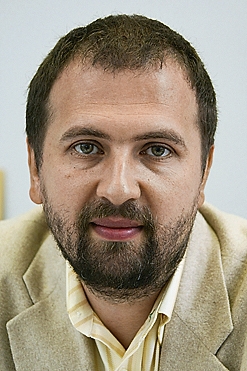
Andrei Zolotov
Andrei Zolotov, Deputy Director of the United Editorial Board of the Foreign Information Service of the RIA Novosti News Agency.
The sentence will not help prevent further blasphemies.
I regret that the court has sentenced them to prison. I am pleased that the Supreme Church Council gave its assessment of the blasphemy and called on the government to show mercy within the limits of the law.
I think that the main and most complex matter in the present situation is to distinguish between the assessment of the event itself which took place in the Cathedral, the video clip on the internet, and the prosecution the three women were subjected to.
The wide-ranging debate that has unfolded around the event shows that it has touched some very raw nerves concerning Church-State relations in our country.
The problem is that although the issues involved are very important and even vital, the form in which the demonstration took place and the reaction to it by the State will in no way help find solutions to the issues.
I think that if it is a matter of criticizing the social and political position of His Holiness Patriarch Kyrill, that is possible, there is nothing wrong with that, provided that the criticism and even protest is expressed in a civilized way.
As I have already said a number of times, if this group or some other group had organized a demonstration outside the Patriarch’s residence, that would have been completely different to what they did in the Church. In my opinion, the trial and the verdict reached have not furthered the main aim, which should have been to avoid such incidents from happening again.
I think that in this situation a conditional sentence would to a far greater degree have decreased social tension and headed off any further blasphemies in Orthodox churches, and not only in them. As regards the demonstration itself, I would say that it certainly deserved to be taken to court. But the legal actions taken seem to me to be wrong, disproportionate and counterproductive.
It seems to me that the end result of this prosecution of these women is that what they did has been forgotten and what stands out is the extremely harsh actions in relation to them and this has radically altered the situation with regard to what they actually did.
I would like to remind you that immediately after what they did in Church, public opinion was on the Church’s side, but after the three women had been arrested and their trial started, opinion shifted in their favour. The appeal of the Supreme Church Council is the first statement, officially, at high level and on behalf of the hierarchy, which has called on the government to show clemency towards the women who committed this act of blasphemy.
I think that, given the background of a whole series of far from merciful private opinions expressed by Orthodox, both clergy and lay, such a statement is very heartening.
Elena Zelinskaya, Vice-President of ‘Media-Soyuz’.
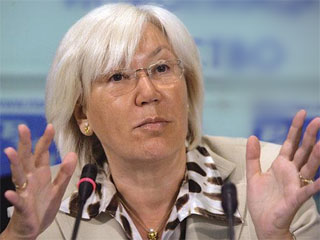
Elena Zelinskaya
This sentence is offensive to me as a believer.
The sentence yet again demonstrates, as in the case of other recent trials, that the courts in our country are incompetent, they simply perform ritual services in order to cloak the decisions of those who take them in an apparently decent legal form.
What really gets to me is that this legal nihilism is acceptable to a large part of our society. The concept of the supremacy of the law is foreign to them. Neither those who are engaged in the legal system, nor those who have to rely on its defence need it. The court reaches verdicts which are the results of emotions.
Until the last minute I had been hoping that common sense would prevail and they would not choose to show their contempt for the law so openly. They came to a verdict. Those who are pleased at today’s sentence are the first who will feel its serious consequences.
I can understand that this story is only just beginning. The discussions will go on and on in even more furious tones, of course the attorneys will appeal and go as high as they can. I cannot speak for all believers but this sentence is offensive to me. The whole affair presents believers as barbarians.
Of course, all this is growing pains, pains which come from very rapid growth. After 70 years of destroying everything in people connected with faith, it would be strange if we all suddenly became real believers. But it is all the same very sad. It is difficult to imagine what would have happened had it not been for public opinion. This is perhaps the only positive feature in the story – if there is anything positive in it at all.
Archimandrite Tikhon (Shevkunov), Superior of the Sretensky Monastery in Moscow – comments on Vesti.ru.
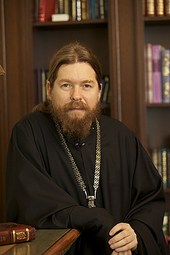
Archimandrite Tikhon (Shevkunov),
The Church forgave the members of the punk group from the very beginning.
A precedent has been set. This was a crime. Whether the sentence was really harsh is another issue altogether. Sometimes the Church is accused of not forgiving them. But we forgave them from the very beginning! Not to forgive is not Christian.
But society and the government have to nip such acts in the bud. I think that there are now in the Church people who would like the sentence to be mitigated in some way. I don’t know if the State will listen to them or not.
Archpriest Alexey Uminsky, Rector of the Church of the Life-giving Trinity in Khokhlakh (Moscow), confessor at St Vladimir’s High School.
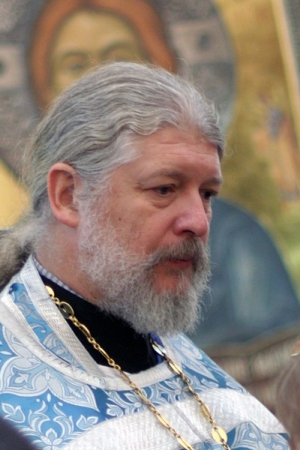
Archpriest Alexey Uminsky
The statement made by the Supreme Church Council came too late.
I followed the trial from the outset and I got the impression that today’s verdict is not connected with defending the Church’s interests, but with the political repression of these three women. As any Christian, naturally I am indignant at what they did, which today’s statement of the Supreme Church Council terms blasphemy – and I agree with that, but all I can see in the actual sentence is political repression.
It seems to me that the statement of the Supreme Church Council came too late. The statement should have been made straight after this disgraceful act occurred, characterizing it as blasphemy and calling those who committed it to repentance, but above all explaining to them the error of their ways. Judging by what these young women said in court, it seems that they still have not understood what they did wrong. They say they had no intention of hurting the feelings of the faithful and they were only expressing political protest. There is no reason not to believe them, but the form of the protest itself was blasphemous. We must understand and condemn this and explain it to these women. If all this had been done from the outset, the Church would have had the opportunity not to take part in a political trial at all. But now when this statement has been made after all that has happened, appeals to the authorities to show clemency are hardly noticed against the background of accusations of blasphemy.
It appears now as if there have been two sentences. The condemnation by the Church of a blasphemous act is also a sentence, though not by a Church court. This sentence should have been heard, but much earlier on. But now it appears as if it is only after the condemnation of these women by the State, that the Church has also had and used the opportunity to condemn them.
They have also been punished by having to be in custody for some six months, a punishment which is not part of our criminal legislation. There are no laws about defending religious feelings, but there are laws against incitement to religious hatred and enmity. But they did not call for religious enmity, they committed a blasphemous act against the Church. An act of blasphemy is in the legal competence of a Church court. It can judge and call to repentance – then the Church would not have been dragged into a situation which became a socially divisive scandal. Just when the Patriarch is calling the peoples of Russia and Poland to peace and forgiveness, we can see that our people are very divided by this trial. I consider that the sentence will be detrimental to the interests of the Church, because the Church has been drawn into this trial by the media as an apparatus for repression, which it cannot in its very essence be.
Archpriest Dimitry Smirnov, Rector of the Church of the Annunciation to the Most Holy Mother of God in Petrovsky Park.
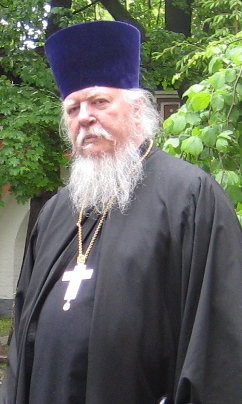
Archpriest Dimitry Smirnov
We must pray that the sentence will be of benefit to those who have been given it.
We must pray to God that this sentence will be beneficial to them, that they will draw conclusions from it which are pleasing to God.
They are still young, we would not want their souls to perish in hatred.
Please God, they will understand what they have done wrong.
Archpriest Alexander Sorokin.
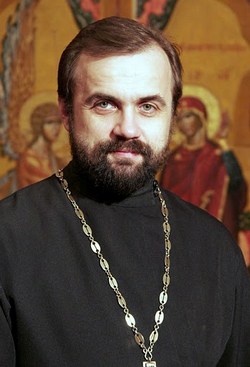
Archpriest Alexander Sorokin.
God is not mocked.
I am much more saddened than gladdened. From my viewpoint in such a situation a more lenient sentence would have been more justified. I consider this sentence is much too harsh.
In fact, everyone has already suffered enough in this affair and everyone is feeling uncomfortable. Especially if you consider that the person they wanted to offend cannot be offended. I am speaking of Christ. As the Scriptures say, holiness is not mocked. God is not mocked.
From a Christian viewpoint, I think it would have been possible to show not even magnanimity or mercy, but just sweet reason. I don’t think such a sentence will lessen tension and that will be that.
Larisa Pavlova, Prosecuting Attorney in the Pussy Riot case.
The sentence is unusually circumspect.
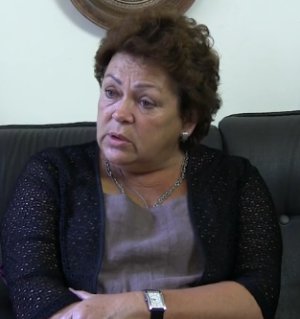
Larisa Pavlova, Prosecuting Attorney in the Pussy Riot case
I would like to point out that the sentence is unusually circumspect. The court described in detail why it had reached its verdict, what was wrong with the acts of the accused, and explained in its arguments which acts of the accused showed the presence of a religious motives, enmity and hatred directed against Orthodox believers as a particular social group.
It is also very important to note that the sentence itself, two years imprisonment, takes into account not only mitigating circumstances, but measures of a reforming character. The sentence shows that inasmuch as the accused do not recognise their guilt and basically are not repentant, the court considers that the degree of the punishment must involve a loss of freedom. Not every sentence takes such things into account.
As regards the Church’s appeal to the authorities for clemency, to me that seems to be very timely. If the Church had interfered or had tried to influence the court in some way, then it would have been accused of influencing the court and that is inadmissible. But today the Church appealed to the authorities to show clemency. This means that each of the accused has the right to decide for themselves whether they are prepared to appeal to the authorities for a pardon. This is standard procedure in our justice system – if you appeal for a pardon, you can be shown clemency and you can even be released without punishment. The formula which the Church chose to use is well-founded, legal and expresses precisely the opinion of the Church.
If the accused themselves want to receive a pardon, they can appeal to the authorities, and the Church hopes that in such a case the authorities will show clemency and heed the Church’s opinion. These are my reflections after the sentence was passed.
Selected excerpts translated from the Russian












